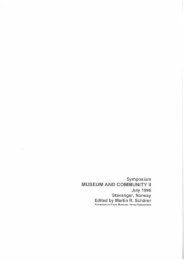Key Concepts of Museology - ICOM
Key Concepts of Museology - ICOM
Key Concepts of Museology - ICOM
You also want an ePaper? Increase the reach of your titles
YUMPU automatically turns print PDFs into web optimized ePapers that Google loves.
INSTITUTION<br />
n. (From the Latin institutio, convention, setting<br />
up, establishment, arrangement). Equivalent<br />
in French: institution; Spanish: institución;<br />
German: Institution; Italian: istituzione; Portuguese:<br />
instituiçāo.<br />
Generally speaking an institution<br />
indicates a convention established by<br />
mutual agreement between people,<br />
being thus arbitrary but also historically<br />
dated. Institutions are elements<br />
in the broad range <strong>of</strong> solutions that<br />
mankind has created to answer the<br />
problems raised by the natural needs<br />
<strong>of</strong> life in a society (Malinowski,<br />
1944). More specifi cally, institution<br />
refers to an organism that is public or<br />
private, established by society to fi ll a<br />
specifi c need. The museum is an institution<br />
in the sense that it is governed<br />
by an identifi ed legal system <strong>of</strong><br />
public or private law (see the terms<br />
Management and Public). Whether<br />
it is based on the concept <strong>of</strong> public<br />
trust (in Anglo-Saxon law) or public<br />
ownership (in France from the Revolution),<br />
demonstrates, beyond the<br />
differences in conventions, a mutual<br />
agreement between the people in a<br />
society, that is to say an institution.<br />
In French, when the term is associated<br />
with the general qualifi er<br />
‘museal’ (institution muséale, in the<br />
I<br />
common sense <strong>of</strong> that which relates<br />
to museums) it is <strong>of</strong>ten used as a<br />
synonym for ‘museum’, most <strong>of</strong>ten<br />
to avoid excessive repetition <strong>of</strong> the<br />
word museum. The concept <strong>of</strong> institution,<br />
for which there are three<br />
precise accepted meanings, is nevertheless<br />
central to debates regarding<br />
museums.<br />
1. There are two levels <strong>of</strong> institutions,<br />
according to the nature <strong>of</strong> the<br />
need they are intended to satisfy.<br />
This need may be fi rst <strong>of</strong> all biological<br />
(need to eat, to reproduce, to<br />
sleep, etc.) or secondly the result <strong>of</strong><br />
the demands <strong>of</strong> living in a society<br />
(need for organisation, defence,<br />
health, etc.). These two levels correspond<br />
to two types <strong>of</strong> institution<br />
that are unequally restrictive: meals,<br />
marriage, lodging on the one hand,<br />
and the State, the army, schools, hospitals,<br />
on the other. In so far as they<br />
meet a social need (sensory relation<br />
to objects) museums belong to the<br />
second category.<br />
2. <strong>ICOM</strong> defi nes museum as a permanent<br />
institution in the service <strong>of</strong><br />
society and its development. In this<br />
sense the institution is a construction<br />
created by man in the museal (see this<br />
term) fi eld, and organised in order to<br />
enter into a sensory relationship with<br />
43
















